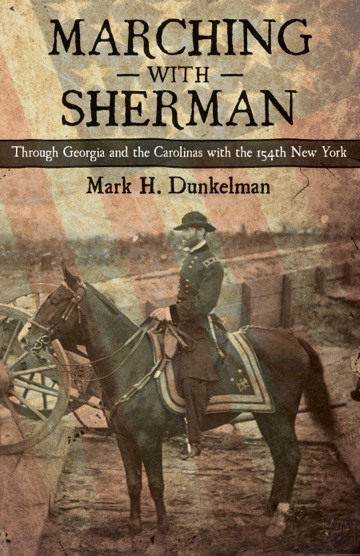Civil War Author Mark Dunkelman Traces Sherman’s March in New Book
Saturday, April 28, 2012
Providence author Mark Dunkelman draws on his great-grandfather's experiences with Sherman during the Civil War to inform his newest work.
You’ve written several books about the 154th New York, the Union regiment your great-grandfather served in. How does knowing so much about his experiences affect what the War means to you?
As my knowledge of my great-grandfather’s service has grown and evolved, my thoughts regarding the Civil War have been shaped accordingly. My interest was stirred as a child by family stories and relics. From my father and aunt I imbibed a legendary interpretation of the Union war effort that cleansed Sherman’s campaigns of their destruction. My early reading in the subject made me realize that my ancestor’s wartime letters and postwar stories offered whitewashed versions of the marches. I’ve had to fill in the missing pieces from testimony by others, including Southerners—but I soon came to realize that they too have their own cherished myths about the war. So my early views of my great-grandfather as heroic liberator have been tempered by a well-founded suspicion that he engaged in activities of which our family would not be proud. In the end, however, how I view the Civil War extends beyond my life-long study of my ancestor’s regiment to encompass all my reading on the subject. I’m interested in how historiography has evolved and influenced interpretations of the war. I’ve appreciated the emergence of memory studies, which tie in with the roots of my own interest.
GET THE LATEST BREAKING NEWS HERE -- SIGN UP FOR GOLOCAL FREE DAILY EBLASTMarching with Sherman makes clear that many Southerners even today demonize General Sherman. Why do you think that is?
History and tradition combine to keep the memory of Sherman hated in the South. A good portion of two cities—Atlanta and Columbia—were burned during the marches through Georgia and the Carolinas, and those fires spread in legend to consume everything in the Yankee army’s wide swath through the three states. Southern resentment of the marches was amplified in the postwar years in the reminiscence literature of the United Daughters of the Confederacy and others. And those accounts, layered with legends, form a bridge to today’s tales of Sherman and his army. Sherman himself is often at the center of many such stories, contrary to fact.
Your book also demonstrates how much Confederate mythology surrounds Sherman’s marches through Georgia and the Carolinas. Do you think Northerners unconsciously embrace their own myths about the Civil War?
Northerners certainly developed their own myths about Sherman and his marches. My own family legend was typical: Dad’s grandfather took part in a great crusade to liberate the slaves, while mildly chastising Southern farm and plantation owners for their sins by taking their pigs and chickens. Other veterans described the marches as an idyllic picnic; an officer of the 154th called it “the most enjoyable campaign of the war.” Southerners saw Sherman as a demonic barbarian; Northerners saw him as an eccentric genius that conducted war in an industrially efficient manner
You’re also well versed on Rhode Island’s place in the Civil War. How would you characterize the role Rhode Islanders played in the conflict?
Rhode Islanders contributed significant manpower and economic and social support to the Union war effort. The batteries of Rhode Island’s First Regiment of Light Artillery are justly famous for their service on many battlefields, as are the 2nd, 4th, and 7th Rhode Island Infantry regiments. Native Rhode Islanders Richard Arnold, Silas Casey, George Sears Greene, Isaac Peace Rodman, Thomas West Sherman, and Frank Wheaton deserve to be remembered for their service as Union generals. Ambrose Burnside, on the other hand, was a kind, sensitive man but a thoroughly inept commander. The state also made major contributions as the producer of munitions and other war materiel in factories and shops. The U.S. Naval Academy moved from Annapolis, Maryland, to Newport for the duration of the war. A huge army hospital opened at Portsmouth Grove (today Melville). Rhode Island might seem remote from Civil War history today, but the war reached into all corners of the state from 1861 to 1865 and beyond.
As we move into the second year of the Civil War’s sesquicentennial period, what’s the most important lesson we should take from the War?
We can pray that a calamity like the Civil War never overtakes our country again. It’s often pointed out that the loss of life, if extrapolated to today, would result in more than six million dead. In a war of similar magnitude, the destruction in property would be catastrophic. To me, the major lessons of the Civil War are the dangers of racism and sectionalism. The Confederacy was formed to ensure the continuance of slavery, specifically African slavery, and the underlying reason for slavery was racism and fear of miscegenation. And the sectionalism that developed and was exacerbated as a result of the slavery issue led to the temporary break-up of the country, stopped only at great cost by the war. Racism and sectionalism do not seem to be dire threats today, but is factionalism—with a strong racial component—informing a new sectionalism of red, blue, and purple states?
Marching with Sherman is available at bookstores throughout Rhode Island. The Rhode Island Civil War Roundtable offers monthly programming about a wide range of Civil War topics. The Rhode Island Civil War Sesquicentennial Commemoration Commission has information about observances of the War’s 150th anniversary.
Related Articles
- Up Close with Author Taylor M. Polites
- Pulitzer-Prize Winner Tony Horwitz Coming to Providence
- Emily Danforth’s Coming of Age Novel Hits Big



